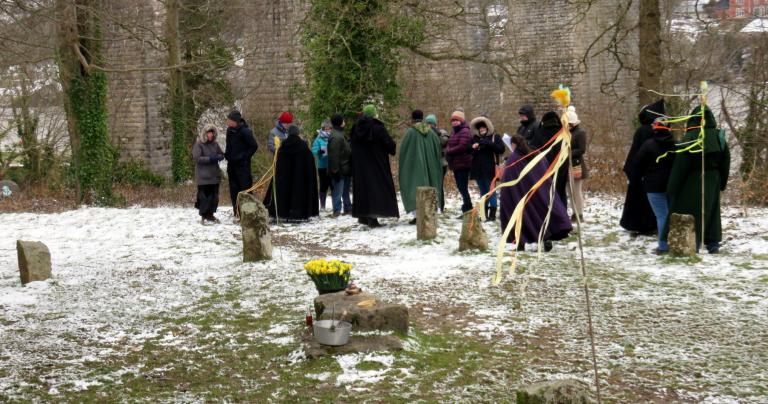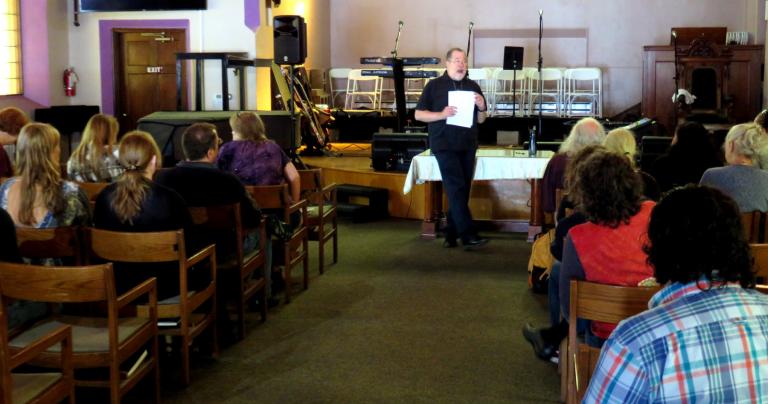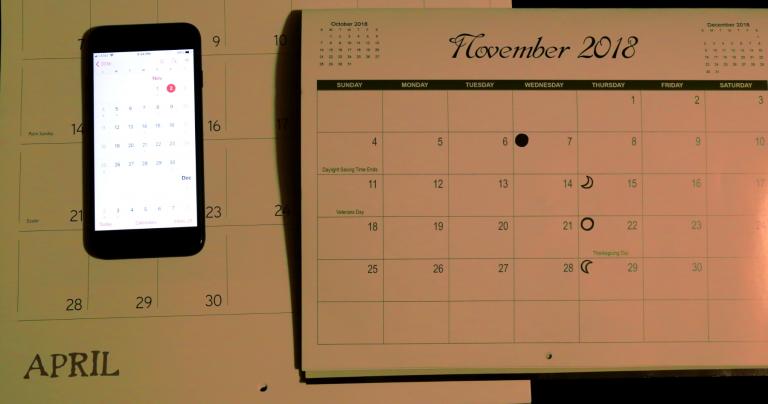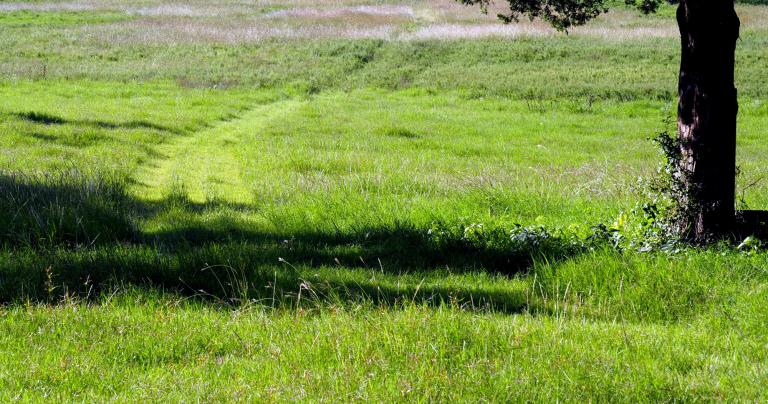I’ve written on Pagan leadership occasionally over the years. One of my early posts that’s held up very well is Pagan Leadership – Roles from 2010. It explains how you don’t have to be a High Priestess or a Chief Druid to be a leader. I told my own story of Pagan leadership in Stepping Aside, last year’s post where I announced that my 12th term as Coordinating Officer of Denton CUUPS would be my last.
Heron Michelle of the Witch on Fire blog has a brilliant post titled How to Avoid Being Burned at the Stake: A Guide for Pagan Leadership. It’s funny and deadly serious at the same time, and I highly encourage you to read it. Although it’s written to Pagan leaders and would-be leaders, it’s really directed at the rest of us who have expectations for our leaders that are unreasonable, unfair, and unworkable.
You can’t control other people’s expectations for your leadership. But you can control how you lead. Here are 13 questions to help you become an effective Pagan leader.
1. Who do you serve?
First and foremost, leadership is about service. It’s what you do to make things better for your group and its members, for your allied Gods and spirits, for the world at large, and in support of your collective values and virtues.
If you have personal obligations and obligations to a group, you must do both. Occasionally that can be done simultaneously, but not always. I led two rituals for Cernunnos at Denton CUUPS, but being an officer in a CUUPS group meant that I also led and participated in rituals for many different Gods and traditions. Those “other” rituals didn’t excuse the commitments I made to Cernunnos and other deities – I had to satisfy Them on my own.
Who are the persons – human and other than human – you serve?
2. What is your mission?
Once you figure out who you serve, the next question is how you go about serving them. Do you hold public rituals on the eight high days? Do you focus on public service and political action? Teach classes? Teach one-on-one? Conduct elaborate magical workings?
Just being a Wiccan coven or a Druid grove or a polytheist religious order is only the beginning. What is it that you do? You cannot be an effective leader unless you understand the mission of the group you lead.
3. What’s on the calendar?
Now we move down to specific actions. What will you do to accomplish your mission?
You need a calendar. Not just a collection of things you’re going to do, but an actual 12-month, SMTWTFS calendar. If you’re a small group that may be a spreadsheet or even a text file. If you’re a larger group you may want a Google calendar or something like it. Regardless of the technology you use, there needs to be one central calendar where all the group’s events and activities are scheduled. Otherwise people will schedule things over your events, or they’ll just forget about them.
The bigger and more active the group, the harder it gets to find times when you can get together. Schedule early, and make keeping your schedule a priority.
4. Can you do it all?
Another advantage of an actual calendar is that it shows you just how much you’re trying to do. And that raises the question of whether or not you can actually do it all.
I cannot tell you how many events and activities you should schedule. Large churches have multiple events going on every day – but no one person is expected to be at all of them. For a coven-sized group, simply gathering at every full moon may be a challenge. We all have lives: work and/or school, family obligations, other interests and commitments. If you try to schedule too much you’ll burn yourself out. If you schedule too little people will lose interest.
Do what you need and want to do to fulfill your mission, but remember that it’s better to do a few things well than to do many things poorly.
5. Who does the work?
Once you figure out what you’re going to do, it’s time to figure out who’s going to do it. A leader will be busy – probably the busiest person in the group. But if you’re doing all the work, you’re setting yourself and your group up for failure.
It’s not your responsibility to do all the work – it’s your responsibility to make sure all the work gets done.
Who’s writing the rituals? Who’s taking part in them? Who’s maintaining the website and Facebook page? Who’s showing up for the roadside trash pickup?
Now ask yourself who’s overloaded and needs help? Who’s ready for more, and needs to be given more opportunities? And who needs nurturing, so they can handle more in the future?
Getting as many people involved (to the extent they want to be involved) without overloading anyone is key to a healthy group.

6. Who do you trust?
I’m not talking about who you think is decent and honest – that’s assumed. If you’ve got someone who’s not decent and honest, that’s a problem you need to deal with, but that’s not what we’re talking about here.
Rather, whose counsel do you trust? Who can you bounce ideas off before presenting them to the entire group? Who will tell you “I think that’s great, but you’ll have to convince Jane or it won’t fly”? Who will tell you “I think that’s the worst idea you’ve ever come up with” – and still be your friend and co-religionist afterwards?
Sometimes this is an experienced elder. Sometimes it’s a new person who doesn’t know all the dirty laundry from the past. Most times it’s someone who’s intelligent, observant, and who’s completely dedicated to the group and its mission.
7. How will you make decisions?
Some Pagans still fetishize consensus. That can be a good way to make sure everyone is heard, but in large groups it can be unwieldy, and it allows any one person to hold up a decision, even though they may not be heavily invested in the decision or even in the group.
If your group has by-laws (and if it doesn’t, it should) they will specify how major decisions are made. But leaders have to make impromptu decisions all the time. Who will you consult? Who will you allow to veto your decisions?
There are many ways to run a group, from highly democratic to highly autocratic. No one way is the best way in all circumstances. You can’t know what decisions you’ll make before you have to make them, but you can understand the process you’ll use to decide.
8. How will you communicate decisions?
Whether a leader makes a command decision or a group makes a democratic decision, that decision has to be communicated to the rest of the group.
Change the date of a ritual? Decide to use group funds to buy a new statue? Invite non-members to what was supposed to be a closed event? Everyone who wasn’t there when the decision was made needs to be informed.
This is partly a technical question: are you going to use e-mail, phone calls, Facebook, or something else? But mainly it’s a reminder that all decisions have to be communicated so the group remains on the same page.
9. What’s your vision?
A good leader is more than a bus driver who can read a map. A good leader has an idea of where the group should go when they get on the bus – and sometimes that’s places that aren’t on the map.
What are you doing now that you need to do better? What should you stop doing? What should you start doing? What are your long-term goals?
Growth is good, but just getting bigger doesn’t necessarily make things better. Does getting bigger allow you do serve more people? Or does it just strain the handful of people who are doing all the work?
Does your group need to broaden its focus? Do you need to stop being so Celtic-focused and do something Norse or Hellenic for a change? Or do you need to narrow your focus and just be a Gardnerian coven? There is no one right answer. Consider the needs, desires, and skills of your group, its mission, its members, and the wider community.
10. How will you promote your vision?
This is similar to communicating decisions, but it’s more complicated. That usually just requires relaying facts, and perhaps some reasons why. Promoting a vision means you’re painting a picture for people, usually with words but sometime with actual pictures and other visual aids.
Where do you think the group should go? How will you get there? What will the journey be like? What obstacles will you face, and how will you overcome them? And most importantly, what will it be like when you get there?
If you can get people excited about your vision, they’ll join you for the trip. If you can’t, they’ll drag their feet, or oppose you outright.
11. Are you embodying the virtues and values you promote?
What a leader does is important. How they do it is just as critical.
Are you walking your talk? Are you leading by example? Are you actually doing everything you’re telling others they need to be doing?
People will listen to what you say. But they’ll watch what you do even more closely. And if they think you’re a fake or a hypocrite (whether you are or not) they’ll tune you out in a heartbeat.
12. Are you training your successor?
This is one of the hardest things to do in a small group. You’ve barely got enough people to get all the work done, much less enough to apprentice to an active leader. And if your group is really small, you may not have anyone else who has the skills and motivation to do the things you do.
Still, people move, they burn out, and eventually we all die. The group must continue.
At the very least, make sure someone knows how to do everything that you can do. Maybe they can’t do it as well as you, but at least they’ll have some idea of what needs to be done if you suddenly aren’t available for whatever reason.
13. Is it time to step aside?
I learned so much in my 12 years as Coordinating Officer of Denton CUUPS because I kept encountering things that needed to be done and I had to figure out how to do them. Eventually you need to step aside so someone else can have those opportunities for learning and growth.
Groups go through stages: start up, initial growth, stabilization, and transformation. A leadership style that’s effective at one stage may not be so effective at another. My leadership style worked well (and was probably necessary) when Denton CUUPS had 20 members. At 50 members the group needed a different kind of leader.
You probably won’t know until it’s time, but if you don’t continually ask the question, you’ll be too late.
Answering these 13 questions won’t guarantee no one will try to burn you at the stake. Too many Pagans have unrealistic expectations for our leaders. But working through them will help you be a more effective leader. And when you show people what good, effective leadership looks like, they’re less likely to start gathering firewood. And more importantly, your group is more likely to fulfill its mission.



















